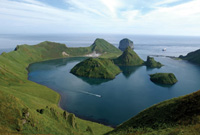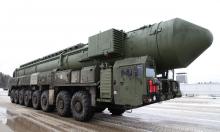Japan drools over Russia's vast territory
The relations between Russia and Japan worsened in July after the Japanese parliament passed the law asserting sovereignty over four islands and declaring them an integral part of Japan.

Official spokespeople for Russia’s Foreign Affairs Ministry and the State Duma (the parliament) urged the Japanese law-makers to cancel the law. The Russian official said that the law would only complicate the bilateral ties between the countries.
Russia’s Medvedev touched upon the subject on July 9 during his meeting with Japanese Prime Minister Taro Aso in Italy, within the scope of the G8 Summit.
“President Medvedev said that discussing such complicated issues as the signing of the peace agreement and the territorial dispute must take place under the conditions of the adequate atmosphere, which had not changed for the better during the recent times,” Russian presidential aide Sergei Prikhodko said.
The Federation Council addressed to Dmitry Medvedev on July 7 with a request to set a moratorium on the visa-free travel between Japan and Southern Kuril Islands (the non-visa regime was introduced in 1992).
About 750 residents of the Far Eastern city of Yuzhno-Sakhalinsk protested on Friday against Japan's claim to four disputed Pacific islands, RIA Novosti reports. Organizers said no political party was behind the gathering. Among those who addressed the crowd were World War II veterans and members of the city's nongovernmental organizations.
"The islands were, are and will be ours," said Yuri Andreyev, acting chairman of the city's council of WWII veterans, the news agency said.
Japan has been persistently claiming its rights on Russia’s four Kuril Islands for over 50 years already. Russia insists that the islands were annexed to the USSR after Japan’s defeat in WWII. Japan claims that it will not sign the peace treaty with Russia, whereas Russia claims that it will not give the islands away in return for the treaty.
Viktor Pavlyatenko, a senior scientist of Russia’s Institute for Far East, told Pravda.Ru that the dispute did not have any economic influence on the relations between the two countries.
“The ties between Russia and Japan get stronger every year. However, the Kuril issue is like a fly in the ointment. Japan sets territorial claims to Russia, but it is Japan that creates more problems for itself. Russia, for instance, may veto Japan’s bid to obtain the status of a permanent member of the UN Security Council. However, I do not think that there will be too much drama out of this situation,” the expert said.
“However, Japan can go too far with its territorial claims to Russia. Let’s take a look at the Atlantic Charter of 1941 (the charter was passed by the USA and Britain, the USSR joined the document; Japan was the enemy of these three nations). The document stipulated that the allied states could not enlarge their territories with the help of the territories, which Japan conquered.
“This is the corner stone of the entire dispute. Japan did not have to wage war to win the Kuril Islands. They got the Southern Kurils without any combat action in 1855 and received the rest of the territory in 1875 in return for the promise to renounce claims to the island of Sakhalin. Japan unleashed the war in 1905 and won the southern part of Sakhalin. Soviet troops occupied that part in 1945 - solved.
“Japan’s Foreign Ministry said during Taro Aso’s visit to Sakhalin this year that the status of the South of Sakhalin had not been finalized. That remark is extremely important because it outlines the future politics of Japan. This nation may not be interested in obtaining only four little rocky islands,” the scientist said.
Sergey Balmasov
Vadim Trukhachev
Pravda.Ru
Subscribe to Pravda.Ru Telegram channel, Facebook, RSS!





